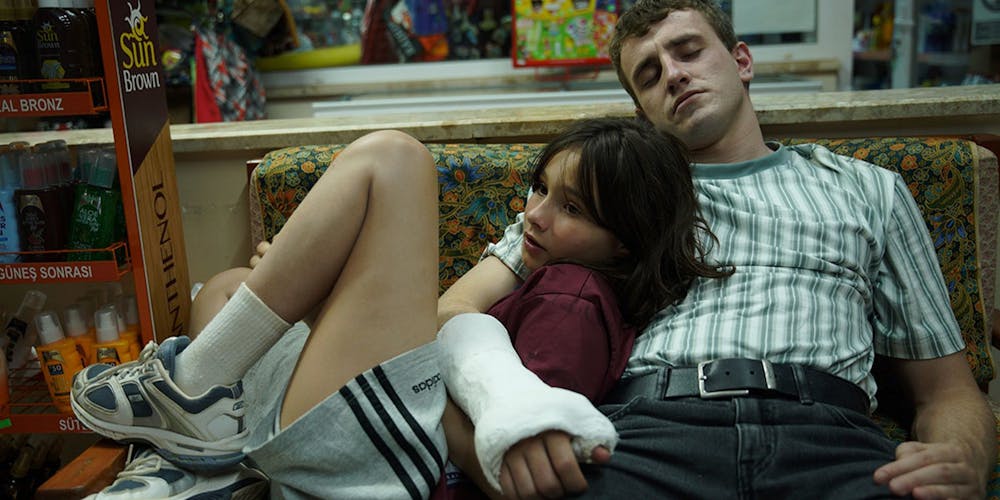SPOILER ALERT: This column contains potential spoilers about new film “Aftersun.”
Every year, a quietly brilliant film that stuns critics but receives a limited theatrical release comes along. These films are always sophisticated and oftentimes the ultimate tear-jerker, but they never seem to reach the masses in the way they deserve. “Aftersun,” the feature-film directorial debut of Charlotte Wells, just may be the magnum opus of this quasi-genre.
“Aftersun” follows a Scottish father and daughter while on vacation in Turkey. Opening with hazy, home video footage, the film takes place sometime in the past — most likely the '90s. The film is interspersed with dreamy hallucinations from the present, but most of the runtime is spent observing the relationship between 11-year-old Sophie, played by newcomer Frankie Corio, and her father Calum, played by a devastating Paul Mescal.
Related: [Free Halloween film screening to be held at Radio-Television Building Oct. 27]
The film doesn’t follow a traditional narrative structure, opting for a meandering and meditative pace instead. We see Calum and Sophie enjoy their resort’s food and amenities, lounge by the pool, go on excursions to surrounding places and simply exist in each other’s company.
We quickly realize this vacation is Sophie’s last memory of her father, which makes the quiet moments between them all the more bittersweet. While Calum’s fate is never explicitly stated, we can infer that he passed away sometime after the vacation. This absence is beautifully portrayed in current day Sophie’s visions. In these hazy moments, Sophie follows her father — still the same age as he was in her memory — through a claustrophobic, strobe-lit nightclub, but he’s always out of her reach.
The bond between Calum and Sophie is layered with nuance and realism. Melodramatic moments and screaming matches are cast aside. Instead, Wells finds conflict in the unavoidable miscommunication between parents and their children: Calum and Sophie may love each other more than words can say, but they don’t really know or understand one another.
Paul Mescal portrays Calum charismatically, making him one of the best “movie dads” of recent years. But it’s his sensitivity that lingers from scene to scene, casting a melancholic cloud over Calum and Sophie’s entire vacation.
Calum became a dad when he was a 20-year-old. He admits the weight of parenthood is something he didn’t expect to deal with at this point in his life. Calum alludes to his reckless past, even mentioning that he used to not be able to picture himself at 30. But it’s understood that his undying love for Sophie has made him into a better man.
He has strange hobbies for a Scottish man in the nineties — tai chi and dancing — and although Sophie pokes fun at these, she loves his idiosyncrasies. Calum expresses his love through shared bits of wisdom and time together. Although he’s a man of few words, his sense of humor shines through, reflecting in Sophie’s spirit.
And yet, Sophie’s memory of her father is waning. In the present day, she struggles to put together the pieces of this moment in time. As a kid, she knew her father was sad but didn’t know why. She knew he struggled with money. She understood that he felt immense pressure to be a good dad. Because the memory of him is all that’s left, she clings to it.
Stylistically, “Aftersun” is one of the most beautiful films of the year. The 35-millimeter cinematography is vibrant, grainy and nostalgic. The shot framing is meticulous, yet simple. Nostalgic tunes like “Tender” by Blur and “Losing My Religion” by R.E.M. populate the soundtrack. A dance sequence set to “Under Pressure” by Queen and David Bowie is in the running for the best scene of the year.
Related: [COLUMN: The Arctic Monkeys continue to evolve with earnest grandeur on ‘The Car’]
The final scene is a gut-wrenching work of art. As I was watching it in the theater, the significance of the moment was overwhelming – I remember thinking to myself, “I need to remember this.”
“Aftersun” will linger in my mind for a very long time. It’s one of those rare films that completely transcends preconceived ideas about what can be achieved with the medium.




